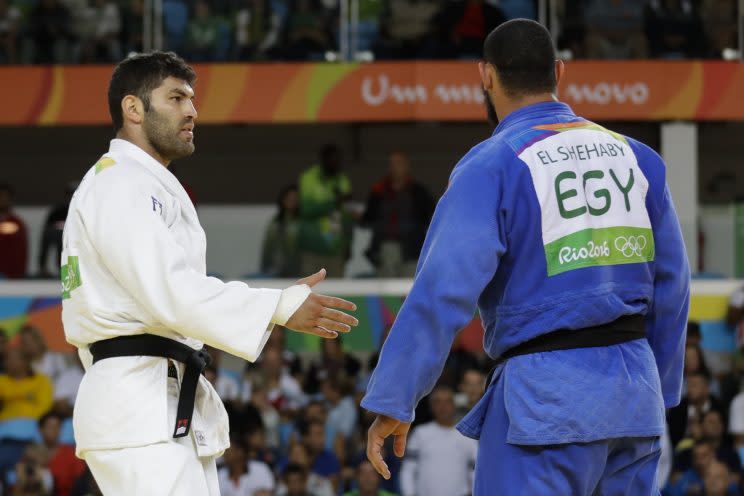Israel-Middle East tension boils over at Olympic judo match
Medal count | Olympic schedule | Olympic news
RIO DE JANEIRO — He moved toward his opponent in a gesture of sportsmanship, reaching out his hand. And the other man turned away.
Then the boos came like rain.
Or Sasson, a long-shot medal contender for Israel, had just defeated Egypt’s Islam El Shehaby in their early-round 100-plus kg judo match in front of a packed house, and El Shehaby refused to shake his hand.
The referee of the match forced El Shehaby to bow, and he did so, but by then the Israeli man was gone.
[Related: Chinese swimmer tests positive at Rio Games]
El Shehaby walked through the press area without stopping for interviews. (One later report said he decided to quit the sport.)
The IOC has decided to look into the matter.
“We believe the Olympic movement should be about building bridges, not erecting walls,” said spokesman Mark Adams. “There’s absolutely no excuse for it.”

Even a spokesman for Israeli Prime Minister Benjamin Netanyahu weighed in on Twitter, calling the situation “shocking” and writing, “Sports are not the field for politics and extremism.”
It was only the latest episode of sporting tension between Israel and some of its Arab neighbors, with the backdrop being so many years of political tension. Last Sunday, Saudi Arabia’s Joud Fahmy forfeited her first-round match against Christianne Legentil of Mauritius and some speculated it was to avoid Israel’s Gili Cohen in the next round. The Saudi Olympic team said Fahmy was injured.
That came two days after the Israel and Lebanon teams were told to share a bus back from the Opening Ceremonies. The Lebanese delegation refused.
In 2011, a judoka from Egypt refused to shake his Israeli counterpart’s hand, which is customary in the sport. The next year, he refused again.
Friday ended joyously for the Israeli delegation as Sasson went on to capture bronze – an upset that gave the nation only its ninth Olympic medal. But after his final match, even amid celebration, the conversation didn’t stray far from what El Shehaby did.
[Related: Hope Solo calls Swedes ‘cowards’ but blame for Olympic exit falls on U.S.]
“I’m an athlete, I came to fight,” Sasson told Yahoo Sports. “I’m sorry for that. In judo, we always respect the others. This is his decision, his country. I can’t say nothing about that.”
Islamic and nationalist groups had been pressuring El Shehaby not to compete at all. (Egypt was the first nation in the Arab world to sign a peace treaty with Israel.) One TV host advised him, “Don’t be fooled, or fool yourself, thinking you will play with the Israeli athlete to defeat him and make Egypt happy.” He went on to warn that El Shehaby “will be seen as a traitor and a normalizer.”
Yet some in the Israel delegation chose not to criticize El Shehaby, commending him for navigating a difficult situation.
“I think this guy from Egypt did the right thing, from his perspective, I would say,” said Israel Olympic Committee President Igal Carmi. “When he came to fight, it was against [the wishes of] many people there [in Egypt]. They were pushing him hard … and he chose a compromise.”
Yael Arad, who is the first Israeli to ever win an Olympic medal (also in judo), went even further.
“It’s very important that he decided to compete,” she said. “I read how stressed he was. I really appreciate it. I hope he will be safe in Egypt.”
The Egypt Olympic Committee said El Shehaby was “alerted before the match to abide by all the rules and to have sporting spirit during his match with the Israeli player.”
Sporting spirit is the norm at the Olympics, and each Games usually has at least one tale of inspiring sportsmanship between nations. But in the Middle East, the anger is often too deep to overcome.
“You hope in the Olympics people will find the better of themselves, but apparently not,” said Israel swimmer Gal Nevo, who is a friend of Sasson’s. “I think it’s more they’re worried about their own sake, at home. You go to the fight, finish it, like a man.”
Nevo then spoke of his friend.
“He’s the opposite of a fighter. So kind, so generous. He cares about people. He told me once, ‘I love this sport but I hate this sport because I have to be bad.’”
Those words have another layer of meaning after what took place Friday.



